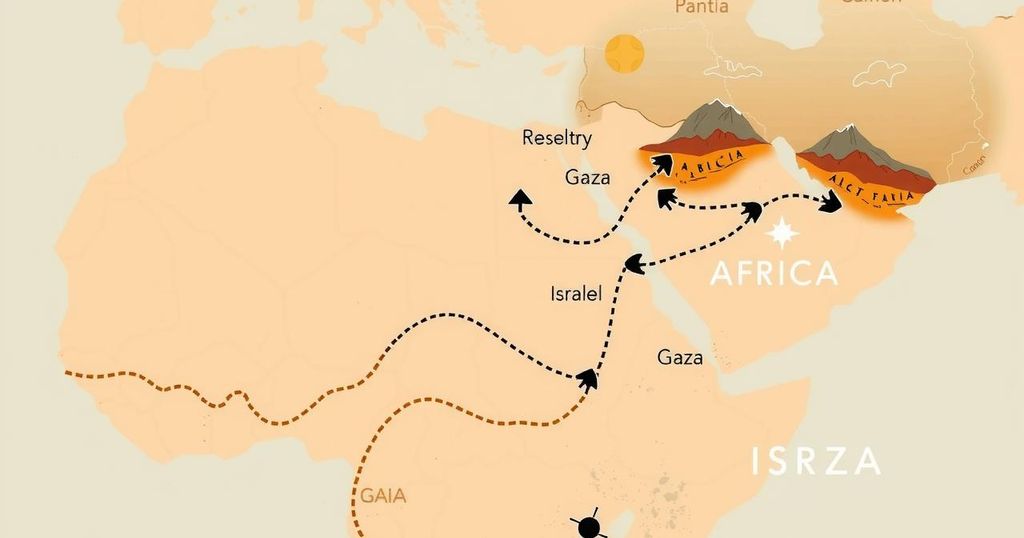The U.S. and Israel are exploring resettling Palestinians from Gaza in Sudan, Somalia, and Somaliland. However, these nations have largely rejected such overtures, expressing concerns over the moral and legal implications. The proposal, tied to Trump’s postwar plan, continues to face significant opposition from Palestinians and regional partners. Disruptions caused by ongoing conflicts in Sudan and Somalia’s strong pro-Palestinian stance complicate potential negotiations.
The United States and Israel are engaging with three East African nations—Sudan, Somalia, and Somaliland—to explore possibilities for resettling Palestinians displaced from Gaza. This initiative emerges from President Donald Trump’s proposed postwar strategy, which has sparked significant legal and ethical concerns. Given the socio-economic conditions in these regions, doubts arise regarding Trump’s aspirations to provide a favorable resettlement environment for Palestinians.
Sudanese officials have reportedly rejected the overtures from the United States, while officials in Somalia and Somaliland expressed unawareness of any discussions. Trump’s plan involves relocating over 2 million Gazans permanently, where the U.S. would reclaim control of the territory and transform it into a development project.
Initially perceived as a fringe idea, the mass transfer notion was publicly endorsed by Israeli Prime Minister Benjamin Netanyahu as part of Trump’s broader vision presented in a recent White House meeting. However, Palestinian citizens vehemently reject the plan, arguing that the purported voluntary relocations are simply not credible. Combined with regional opposition, including alternative reconstruction proposals, the plan faces substantial scrutiny from human rights organizations.
Despite clear opposition, U.S. officials affirm that Trump remains committed to his vision. Anonymous sources have indicated ongoing communications with Somalia and Somaliland, while confirming that contacts with Sudan also took place. These initial outreach efforts coincided with Trump’s discussions of the Gaza plan, with Israel reportedly taking the lead role in these consultations.
To entice these nations, Israel and the U.S. can offer multiple incentives encompassing financial, security, and diplomatic aid—a strategy previously utilized to establish the Abraham Accords with several Arab states. Neither the White House nor Israeli officials have issued comments on this diplomatic initiative.
Finance Minister Bezalel Smotrich has indicated that Israel is actively seeking willing nations to accept Palestinian refugees and is in the process of developing an extensive emigration department within the Defense Ministry. Regarding the specific countries approached, Sudan distinctively remains embroiled in civil conflict, complicating the U.S. and Israel’s potential negotiations concerning acceptance of Palestinian refugees.
In contrast, Somaliland, having unilaterally separated from Somalia, seeks international recognition amidst its political stability, albeit lacking formal acknowledgment as a country. Reports suggest the U.S. is engaged in discussions with Somaliland that may offer support in exchange for recognition.
Lastly, Somalia maintains a resolute pro-Palestinian stance, with domestic support for Palestinian rights evident in public demonstrations. Many analysts question the motivations behind any potential agreements with Somali authorities while officials have denied being approached regarding the resettlement of Palestinians.
Overall, the proposal to resettle Palestinians in East Africa faces a myriad of challenges, including rejection from the potential host nations, persistent opposition from Palestinian representatives, and various socio-political intricacies inherent to the region.
The initiative by the U.S. and Israel to resettle displaced Palestinians in East Africa raises significant ethical and legal concerns, particularly given the socio-economic challenges of the potential host nations. With Sudan rejecting proposals, while Somalia remains staunchly supportive of Palestinian rights, the feasibility of such resettlement appears increasingly precarious. Moreover, regional complexities and the lack of international recognition for Somaliland further complicate the dynamics, as the Palestinian community continues to resist any form of coerced relocation. Consequently, the proposal remains met with skepticism and opposition, emphasizing the need for comprehensive solutions to the Israeli-Palestinian conflict.
Original Source: abcnews.go.com




